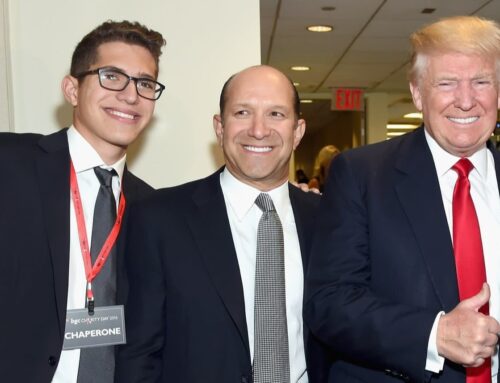Before You Invest Like a Politician, Consider This Dilemma
April 24, 2025
(Image credit: Getty Images)
For decades, the phrase “I’ve got a stock tip, and it’s a sure thing” has been whispered at cookouts and business conferences and by savvy neighbors. We all want to find the next Amazon, bitcoin or Tesla.
Unfortunately, these “sure things” are rarely what they seem. Despite the odds, the search for that magical formula continues.
However, there’s another group that doesn’t need to whisper — a class of investors who make the wind rather than follow it. For years, politicians’ stock trades have faced public scrutiny.
Sign up for Kiplinger’s Free E-Newsletters
Profit and prosper with the best of expert advice on investing, taxes, retirement, personal finance and more – straight to your e-mail.
Profit and prosper with the best of expert advice – straight to your e-mail.
Their access to privileged information — such as pending legislation, regulatory changes or economic policies — has raised concerns about market fairness. High-profile cases of lawmakers making timely trades before major events have only fueled interest in tracking their actions.
Since 2012, the Stop Trading on Congressional Knowledge Act, commonly known as the STOCK Act, has prohibited any elected official from using insider information for personal benefit. The reason for tracking congressional stock moves is simple: If those with potential insider knowledge are making strategic investments, it might make sense to follow their lead.
Still, studies suggest politicians often outperform the market, fueling speculation that their decisions are informed by privileged information — though, of course, inside trading has been illegal for citizens since the 1930s.
So is this a case of if you can’t beat them, join them?
New platforms now offer real-time insights into congressional stock trades. Apps like Autopilot track and mimic these trades, giving retail investors access to the investment moves of political insiders.
With a few taps, investors can see which stocks lawmakers are buying and selling, potentially capitalizing on similar opportunities.
By gamifying this concept, these apps make it easier for retail investors to follow in the footsteps of lawmakers. With detailed transaction data and trend analysis, these tools claim to level the playing field, allowing average investors to benefit from the same moves as those in power.
Let’s examine if there really is an edge, if it can be copied and if that’s a good idea for the average investor (sophisticated or not).
Is there an edge?
Of the 535 total members of Congress, only 113 — roughly 20% — traded individual stocks in 2024. According to estimates from Unusual Whales, Democrats saw an average return of 31.1%, and Republicans saw an average return of 26.1%, both beating the S&P 500, which returned 23.3%.
However, a closer look reveals a more nuanced story. Only 48 of the 113 who traded stocks beat the market, meaning 60% did not. While those 48 outperformed enough to offset the others, fewer than 10% of Congress members outperformed the S&P through stock trading.
Can this be replicated?
Sort of. The STOCK Act requires officials to publicly disclose all securities transactions valued at over $1,000 within 30 days of receiving notice of the transaction and within 45 days of the transaction date. This applies to both buys and sells.
With buy and sell delays adding up to 60-plus days, this becomes a significant disadvantage in our fast-moving, information-driven markets — especially for individual stocks.
Another challenge is the lack of detail in the reported trades. Officials disclose only the broad range of the transaction amounts, such as $1,000 to $5,000 or $5,000 to $25,000, making it impossible to directly replicate a portfolio. The tracking apps only simulate the portfolio by placing equal weight on all positions.
Is this a good idea for the average investor (sophisticated or not)?
In 2024, the average U.S. Congress member had a net worth of $1,008,767, but those actively trading stocks had net worths 10 times higher, with the top 15 members collectively worth over $1.3 billion.
Can you guess which ones typically trade stocks successfully? There is a correlation to a congressperson’s net worth and their investment performance.
One very clear reason is this: Wealthier officials tend to invest in a highly concentrated portfolio, which increases in volatility.
For high-net-worth (HNW) investors intrigued by the concept of tracking congressional trades, here are four key considerations before diving in:
1. Know who you’re following
Not all politicians are equal when it comes to investing. While congressional stock traders outperformed the market, less than 10% actually beat the S&P 500.
Instead of blindly mirroring all political trades, conduct due diligence on individuals with consistency, typically those with substantial personal wealth and a history of concentrated, high-conviction positions.
Congressional trades are subject to disclosure lags, meaning the market has likely already priced in their moves by the time they’re reported.
Unlike hedge funds that move quickly, HNW investors should be aware that following these trades often means playing catch-up rather than getting ahead. Consider if the investment still makes sense based on broader market trends rather than just its political connection.
3. Beware of the crowded trade effect
The more popular a strategy becomes, the less effective it tends to be. Platforms like Autopilot make it easy for retail investors to pile into the same stocks, potentially driving up prices before you even make your move.
Savvy investors should evaluate whether a stock is becoming overbought due to hype rather than fundamentals.
4. Understand the risk profile
Many successful political investors allocate capital in a highly concentrated manner, leading to significant swings in volatility. Unlike diversified portfolios, these positions can suffer severe downturns.
Before adopting a similar approach, assess your risk tolerance and ensure you can withstand short-term market turbulence without compromising long-term financial goals.
Conclusion
While tracking congressional trades can be a compelling strategy, it’s not a substitute for disciplined, well-informed investing.
Instead of chasing headlines, use these insights as one of many tools to refine your investment approach. Remember, the stock market has always been about adapting to new information — whether it comes from politicians, institutions or emerging technologies.
The challenge is knowing when to act and when to step back from the crowd.
Related Content
Profit and prosper with the best of Kiplinger’s advice on investing, taxes, retirement, personal finance and much more. Delivered daily. Enter your email in the box and click Sign Me Up.
Search
RECENT PRESS RELEASES
Peek inside Denver’s new cannabis club, now serving marijuana and munchies
SWI Editorial Staff2025-04-24T06:17:40-07:00April 24, 2025|
Bitcoin & Ethereum Triggers Altcoin 36 Hour Rally, Coldware Holders Benefit Handsomely
SWI Editorial Staff2025-04-24T06:15:12-07:00April 24, 2025|
Bitcoin exchange outflows mimic 2023 as whales buy retail ‘panic’
SWI Editorial Staff2025-04-24T05:02:45-07:00April 24, 2025|
Delaware’s FBI Mix-Up, Minnesota’s Lottery, DEA’s Inaction Lead CBT’s Top Stories in April
SWI Editorial Staff2025-04-24T05:02:39-07:00April 24, 2025|
‘Life savings are on the line’: Michigan cannabis regulator warns of industry crisis
SWI Editorial Staff2025-04-24T05:02:37-07:00April 24, 2025|
Has the stock market hit bottom? History is a guide
SWI Editorial Staff2025-04-24T05:01:46-07:00April 24, 2025|
Related Post




